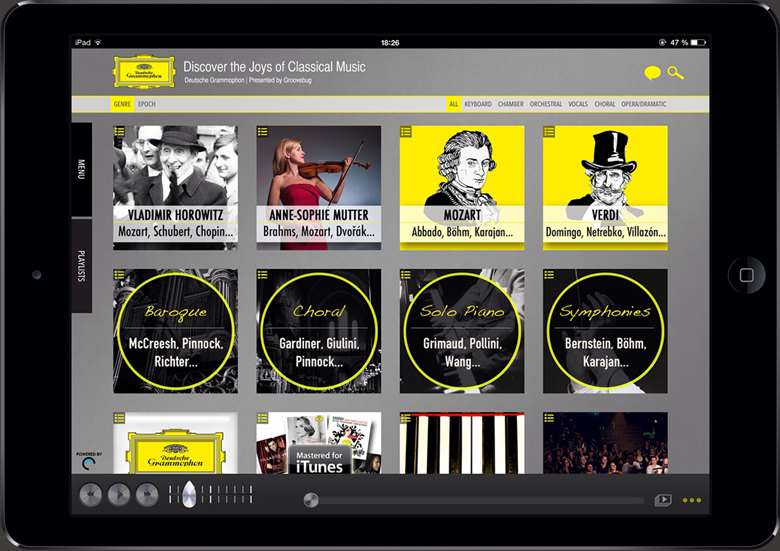Deutsche Grammophon launches own streaming service called DG Discovery
Rebecca Schmid
Friday, August 22, 2014
DG Discovery will give access to 450 albums for £2.49 a month

Rebecca Schmid takes a first look at DG's bold new move into the world of streaming...
Just last week, Gramophone's Editor Martin Cullingford asked a pressing question for artists, industry executives and consumers alike: how much is a recording worth?
‘Rapid developments in online music – first downloads, then streaming – have made most of the history of music available for free or at the very least through an astonishingly good value subscription model,’ he wrote, citing an LP set of the Beethoven symphonies recorded by the Berlin Philharmonic under Herbert von Karajan which sold for just under the average British weekly wage in 1963.
The very label behind this recording, Deutsche Grammophon, has now unveiled what not only a century but even a decade ago would have seemed unthinkable: a streaming app called DG Discovery that grants access to 450 albums for just £2.49 a month. The annual price is £24.99.
That being said, a free version of the app only teases listeners with 30-second clips. And both the free and paid stream versions include invitations to purchase albums on iTunes (for those who want to ‘own’ copies once the subscription time runs out).
The temptation might be hard to resist for classical music lovers who, with the quick entry of their Apple password, can stream or purchase the albums of 80 different artists – from Karajan to Barenboim, Aimard to Zimerman (whose 1985 recording of the Brahms Piano Concerto No 2 with the Vienna Philharmonic under Leonard Bernstein is an ‘Editor’s Choice’). Programme notes; the date, place and format of a recording; and virtual albums covers are all at one’s fingertips.
The app will gradually increase its selection by 20 to 40 albums a month and roll out weekly playlists. The experience is naturally networked with Facebook, where users can share their activity, and DG didn’t forget to include an entry point to its own website.
But the ‘gold label’ is not pandering to the masses. In an interview at Universal Music’s Berlin headquarters earlier this year, DG Digital Media Director Stephan Steigleder emphasized the need to ‘present classical music without dumbing it down but also not on a pedestal for a specific target group.’
The curated interface of DG Discovery is meant to provide listeners with a less chaotic, more informative alternative to across-the-board streaming services such as Spotify (now with some 10 million paid subscribers who have access to over 20 million tracks for a maximum monthly subscription price of £9.99). ‘We’re working against the notion of everything you can eat, all the time,’ said DG President Mark Wilkinson.
Can Deutsche Grammophon prove its sovereignty in an age of limitless access across labels, formats and genres? Are classical listeners satiated by Rolando Villazón and Anne-Sophie Mutter, or do they want to maintain oversight of a larger spectrum via mainstream web platforms? Perhaps more importantly, how can a label maintain business as unusual – and provide artists with royalties – while offering hundreds of albums for under £3 a month?
All this remains to be seen. But perhaps the only stable thing about the recording technology is that it is constantly changing, and as Wilkinson points out, the DG label has always been the first to adopt new technology. ‘The currency of classical music is changing,’ he said. ‘We have to lead the way and bring the artists with us.’
For further information, visit DG's website or view the app on iTunes.







